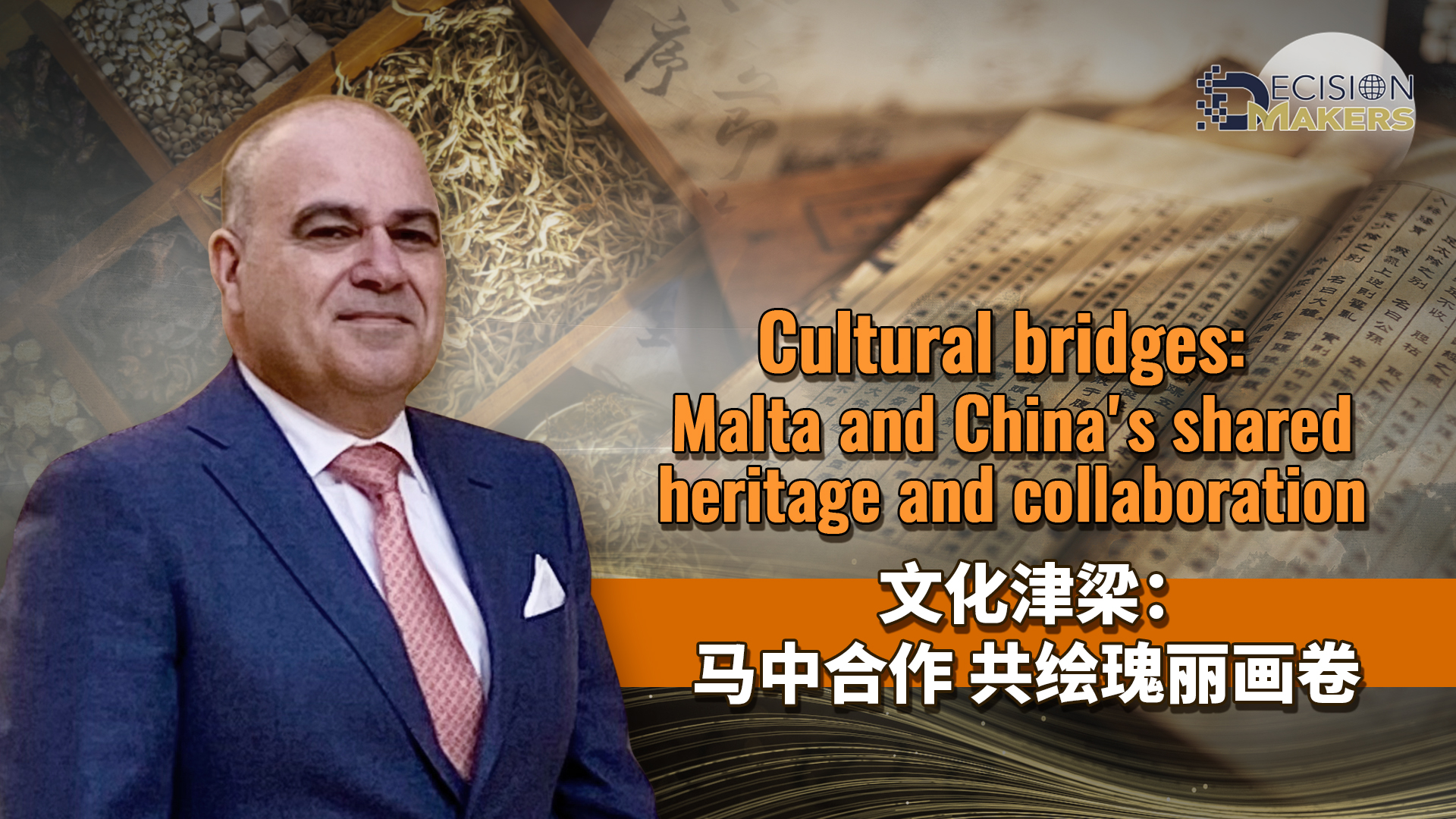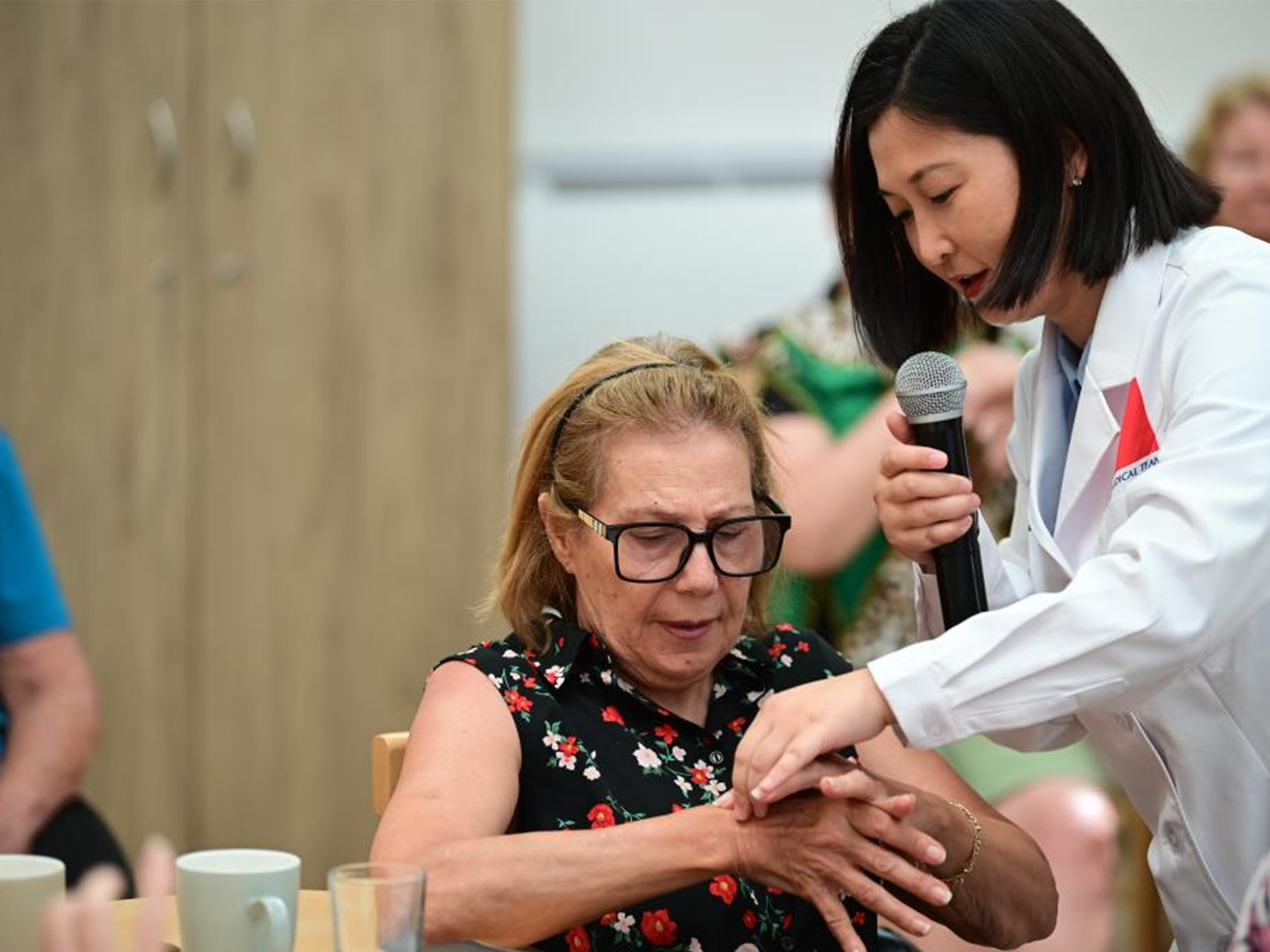Cultural bridges: Malta and China's shared heritage and collaboration

Editor's note: Chinese President Xi Jinping once remarked, "Without full confidence in our culture, without a rich and prosperous culture, the Chinese nation will not be able to rejuvenate itself." As China forges a new path of modernization, its ancient heritage is being revitalized in the new era. Recognizing the importance of cultural exchange, CGTN's Decision Makers column introduces the series "Bridging world, boosting cultures," inviting ambassadors to share their insights on China, its civilization, and cultural communication. This is the third article in the series.
By John Busuttil
Malta is a small island strategically positioned in the center of the Mediterranean Sea. For most of Malta's history until independence was achieved in 1964, Malta has been contested and ruled over by prevailing powers in the Mediterranean. These powers such as the Phoenicians, the Romans, the Arabs, the Knights of St John, the French and British, all have left a legacy on the unique Maltese language, on our culture and food, but more importantly on the architecture in Malta. It is home to numerous fortresses, the most incredible of which is Valletta, our capital city, built by the Knights of St John in the 16th century. Numerous Neolithic temples, some of them more ancient than Egypt's pyramids, dot the countryside, many of them declared by UNESCO as World Heritage Sites.
Today, as a member state of the European Union and having adopted the Euro back in 2008, Malta is classified as an advanced economy by the IMF, and as a high-income country by the World Bank. Malta is further proof that development is achievable for islands and nations without any natural resources.
What makes it a privilege and an honor to be Ambassador of Malta to China is that China in the mid-70s agreed to walk with Malta in our development path. Supporting the proposal of then Malta's Prime Minister Dom Mintoff to find alternative ways to move the Maltese economy away from being a military outpost, China in 1975 agreed to finance the building of No.6 Drydock in Malta's Grand Harbour. The drydock could be used for repairs of super large tankers and even military aircraft carriers. It was the largest drydock in the region at the time and took Chinese engineers alongside Maltese workers six years to build. As one of China's earliest foreign aid projects, the drydock has played an irreplaceable and important role in Malta's economic development.
Since the establishment of diplomatic relations in January 1972, over 60 bilateral agreements have been signed, and Malta officially joined the Belt and Road Initiative in 2018. However, the excellent friendly relations between Malta and China are not only based on political and economic cooperation. Chinese President Xi Jinping has often stressed the vital role of culture in international relations and has also put forward a Global Civilization Initiative, which advocates respect for the diversity of civilizations, the common values of humanity, the importance of inheritance and innovation of civilizations and calls for international people-to-people exchanges and cooperation.

Feng Hua (R, Front), leader of the 19th Chinese medical team for Malta, demonstrates a treatment during a traditional Chinese medicine lecture in Siggiewi, Malta, July 12, 2024. [Photo/Xinhua]
In the city of Paola in Malta, there is a regional center for traditional Chinese medicine (TCM) that was jointly established by China and Malta in 1994 as the Mediterranean Regional Traditional Center for Traditional Chinese Medicine (MRCTCM). The center is in the form of a Chinese courtyard in Suzhou style, where there is a statue of Hua Tuo, a Chinese physician and herbal expert, known for his significant strides in anesthesia, surgery and acupuncture. TCM is at the heart of Chinese culture and has provided people in Malta with an alternative medical system to treat pain and illness. So far, the MRCTCM has welcomed a total of 20 medical teams deployed to Malta by the Chinese government. All doctors and experts from Jiangsu Province. The teams, which change annually, consist of top professionals in TCM and bring a first-class medical service to the local community.
As a result of increased interest in TCM, in 2015 at the University of Malta, in collaboration with Shanghai University for Traditional Chinese Medicine, a Traditional Chinese Medicine clinic was set up, along with the launching of postgraduate courses in Traditional Chinese Medicine. These courses are aimed to professionally train healthcare personnel and help them to attain the high standards of practice required by the World Health Organization.
On September 19, 2003, a building in the heart of Malta's capital city Valletta was inaugurated as a China Cultural Center. The China Cultural Center and the Regional Chinese Traditional Medicine Center were the first of their kind to be set up in Europe, and proved to be very good "green fingers" and must be duly credited for exposing the Maltese from all walks of life and all age groups to what China has to offer. The Chinese Vice Minister for Culture, Meng Xiaosi, during the inauguration of the Center in 2003 said, "Cultural exchange is both a golden key and a golden bridge that can open and connect people's hearts. We have every reason to believe that, from this moment on, the colors of oriental culture will blend their glamour with the beauty of this ancient land."
Culture is all about people, their arts, their intellectual achievement, their ideas, mores, customs, traditions, social behavior and attitude. The best way to get to know a country is to learn its language and its culture. Besides the Chinese Cultural Center which provides courses in Chinese for interested Maltese, in 2009, a Confucius Institute was also established through cooperation between the University of Malta and Xiamen University. The Institute's founding mission is to address the Maltese people's interest in learning Chinese, deepen their understanding of the Chinese language and culture, foster educational and cultural exchanges between Malta and China, and strengthen the friendly relations between the two nations.
Other Chinese cultural initiatives in Malta were the construction of the Chinese Garden of Serenity and the translation of Chinese literature, the greatest achievement being the translation of "The Analects of Confucius" from classical Chinese into Maltese by Salvatore Giuffre. The co-authored publication "China in Maltese Eyes," collates anecdotes from Maltese and Chinese travelers in the two countries, to remark upon the shared cultural values, going back to their archaeological heritage and status as ancient civilizations – as well as the fact that Malta, which had been under Arab rule, is a bit "oriental" like China itself.
Finally, one cannot fail to mention the "China Corner." In 2010, the China Corner at St Margaret College Secondary School in Cospicua was established, mainly as an idea of Martin Azzopardi to teach his students science through different aspects of Chinese culture. In October 2017, St. Margaret's School also opened Chinese language courses for the first time among Maltese public secondary schools. President Xi himself in fact replied to a letter written by the students of China Corner, confirming how much such initiatives are valued. By coincidence, in 2010, the same year, Beijing Foreign Studies University also established a Maltese language major, which the University of Malta and the Embassy in Beijing are strongly supporting.
To conclude, as a member of the European Union, and as an elected member of the UN Security Council, Malta aims to continue to work with China towards the achievement of world peace and the Sustainable Development Goals. In this regard culture has a crucial role to play in SDG 11, which calls for strengthening of efforts to protect and safeguard the world's cultural and natural heritage. China's contribution towards the achievement of the Millennium Development Goals was immense, and it is hoped that China's support towards multilateralism and world peace is similarly manifested in continued strong support towards the achievement of Agenda 2030.
John Busuttil is the Ambassador Extraordinary and Plenipotentiary of the Republic of Malta to the People's Republic of China. This is the third article in the series.


